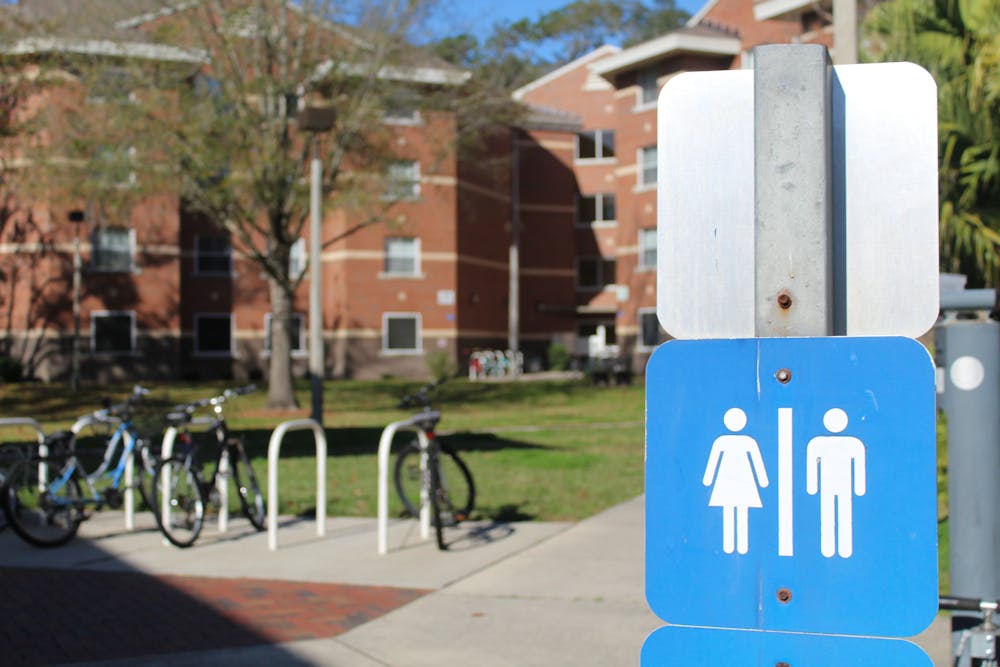When Eden Kershner walks through the hall of his first-floor dorm, the weird looks and the signs on the bathroom stalls make him feel like his gender is constantly being pointed out to him, he said.
Kershner, a 20-year-old UF engineering sophomore and transmasculine individual, is a student resident assistant on an all female floor. Living and leading have been harder to navigate in gendered dorms, he said.
“It frustrates me that my gender is relevant to my living space,” he said.
With a prominent LGBTQ+ community at UF, including the UF Pride Student Union and the UF LGBTQ+ Alumni Association, gendered housing can be a difficult experience for many students on campus.
Out of 26 residence halls on campus, UF only has one gender neutral housing option — the Lavender Living Learning Community, located in Springs Residential Complex, hopes to create a more inclusive and diverse housing experience.
Lavender is suite-style, with a mix of genders on each floor, and shared bathrooms with locking doors between sets of rooms. Some UF dorms split genders up by floor, with communal bathrooms on each end, while others are entire single-gender buildings.
Although not every nonbinary individual identifies as transgender, both are representations of the deviation from a binary gender system and their sex assigned at birth.
Lavender is more expensive than other single-gender dorms, Kershner said. There are 13 residence halls on campus offering traditional single dorms, with an average cost of $3,200 per semester. Because Lavender belongs to the only five residence halls offering suite-style dorms, the average cost is $4,200 per semester.
“Just because I’m transgender and don’t want to live on a floor where there is nobody like me, I would have to pay more,” Kershner said. “Trans people are either there or uncomfortable somewhere else.”
Gendered dorms originated as a safety measure to protect female students from males. However, transgender individuals are over twice as likely to experience violence compared to cisgender individuals, or those who identify with their sex assigned at birth.
But atop the locking doors and the UF Police Department just one call away, the biggest aspect of safety for Kershner is feeling like there is someone to relate to, he said.
“I am uncomfortable being on an all girls floor… but it is just the principle of being there,” Kershner said. “The biggest issue is that it makes me feel isolated when there is no one else… I feel like an other.”
Setting aside the statistics, Kershner emphasized his feelings of overall safety in his building.
“I do feel safe here,” Kershner said. “Everyone has been very accepting so far. I don’t blame the people I’m living with because it has nothing to do with them.”
Andy Gatlin, a 19-year-old UF sustainability freshman who identifies as nonbinary, lives in an all-female residence hall.
“For me, it’s more of a sense of community,” Gatlin said. “My roommate is accepting, there are other nonbinary individuals in the building, and my RA is very cool.”
But Gatlin said a standalone building, like Lavender, may not be enough to support the LGBTQ+ community at UF.
“I wish there were more gender neutral dorms on campus,” Gatlin said. “I feel like once some are changed it’d be easier and be more accepted by students and family.”
Safe and inclusive leadership in on-campus housing is crucial, they added.
“UF dorms should make sure all RAs are accepting people to come to,” they said.
Axel Alumbaugh, a 19-year-old UF anthropology freshman and transgender man, lived in Lavender over a summer term and felt accepted.
“Living in Lavender, it’s not just the LGBTQ+ community; there are straight people too,” he said. “I felt safe with my roommate, so it made me feel safe in my dorm.”
UF creates housing accommodations for transgender students on a case-by-case basis. However, the accommodation request is separate from the original application, according to UF Community Standards.
UF encourages students who are currently living in residence halls to speak with their RA or residence life coordinator about gender accommodations, according to its website.
UF Housing and Residence Life was unable to provide a comment in time for publication.
In comparison, the University of Central Florida also provides accommodations on a case-by-case basis, but its housing application includes a portion that asks whether students’ legal sex corresponds with their gender identity.
While nonbinary and transgender individuals may not experience direct discrimination, several said they experience frequent and common misgendering, or referring to them in a way that doesn’t match their gender identity.
Changing legal forms to his new name has been difficult, Alumbaugh said.
“My dead name is on my email and forms,” he said. “When I applied for a club, they had my dead name instead of my preferred name. I haven’t had a discriminatory interaction, but a lot of people will misgender me.”
Alumbaugh said inclusivity could start as small actions across all UF dorms.
“They should have a floor in each building that is for nonbinary and transgender individuals,” he said. “Every trans person has a different perspective and experience.”
While the future of dorm living on campus is unknown, the interest of gender neutral housing overall remains as not large enough to strike a review in existing UF policies and procedures. In many ways, the insight of transgender and nonbinary individuals draws attention to the validation of this ongoing experience.
Contact Sara-James Ranta at sranta@alligator.org. Follow her on X @sarajamesranta.
Sara-James Ranta is a journalism senior, minoring in sociology of social justice and policy. She previously served as Metro's K-12 education reporter. In her free time, SJ is watching a new show, listening to EDM or discussing Star Wars.






